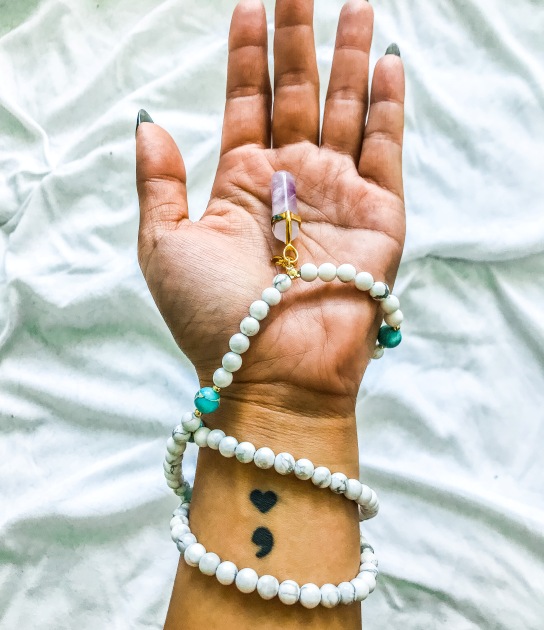Coming out with my #MeToo story was one of the hardest things I have ever had to do in my life.
Going to the grave with my shame seemed like a better option than opening up my soul to even one person, let alone to the whole world. I truly thought that I was going to die with my secret.
For over 21 years, I lived a double life and was really good at it. On the outside, it seemed that I had it all together: a good family, a great career, lots of friends, and an active social life. Behind closed doors, I suffered from post traumatic stress disorder (PTSD), depression, anxiety, several suicide attempts, and alcohol/substance abuse. I wanted to numb myself and forget the seven years of childhood sexual abuse by someone who was supposed to love me. I was slowly dying inside, while for years I pretended that I had moved on and forgotten my past.
One of the biggest reasons I found the courage and strength to step forth and speak my truth was because I was supported by close friends and family members. Because of their love and support, I am now openly talking about an issue that is so prevalent in our society, yet hugely ignored.
I am not alone. There are so many of us out there. Many who are looking for support, acceptance, and love. Together, we can create space for others to find the strength and courage to speak out and step into their truth.
If you know someone who is a victim or survivor of sexual assault/abuse, here are the ways that we can offer our support and hopefully help them find healing.
Do:
Be patient. It is not easy to talk about something so intense and personal. The burden of shame and guilt can keep a person silent even when deep down, we want to talk to someone. Victims and survivors also feel a lot of fear; fear of not being heard and believed, fear of being told it was our fault somehow, fear of judgement, and fear of backlash from our own family and friends. Sometimes it can take months or even years to open up.
Reassure us that we are always loved, supported, and believed no matter.
When I was 14 years old, I confided in a family member in the hopes of being heard and saved, only to be told that I was lying and making things up. That shattered my self-esteem and my trust in anyone. I thought, “If someone who said they loved me didn’t believe me, why would anyone else believe me?” It took me many years to open back up and find the courage to trust someone enough to tell my story.
When I started telling my closest friends, I couldn’t tell my story without sobbing and shaking uncontrollably. But they remained supportive and patient, allowing me to release all that pent up pain while they waited until I was ready to continue telling them my story. The more I started sharing my story, the easier it became to talk about it.
Be present. Please listen. Look at us. Face us. Feel our energy. Do not be distracted by phones, the TV, or work. Be willing to give us your undivided attention. It is terrifying to share this deep soul wound with someone, and if we are not given attention, it can scare us back into silence.
When I first told a boyfriend what had happened to me, he looked me in my eyes, and I felt him trying to see into my soul. He told me I that it was not my fault and that this was nothing to be ashamed of. The way he was completely present with me, seeing all of me, including my hurt inner child, made me believe those words myself. There was power in that presence. I felt him sympathize with me and it gave me strength and hope.
Be encouraging. Give constant and reassuring words of love, acceptance, and nonjudgement. We don’t have to say much. It can be as simple as “Whatever it is, I love you, I support you, and I’m here for you.”
The close group of friends I confided in became my cheerleaders, my supporters, my therapists, and my confidantes. They became my rock that I leaned on when I decided to confront my abuser and tell my family. Some family members who did not want to hear the truth shamed me for it.
When my own family didn’t offer me the support I needed, I didn’t crumble the way I did when I was a teenager, because I had the support of my friends. Those friends are my family now. They lifted me up when the fears and doubts started creeping back in. No words can describe the gratitude I feel for having their encouragement and support to speak my truth.
Don’t:
Talk right away. Do not feel the need to “say the right thing” or voice opinions or give unwanted advice. Remember that this is about the victim/survivor. Often times, we just want someone to truly listen to us and our story. Don’t feel the need to fill in silent gaps in the conversation just because we feel nervous that we aren’t saying enough. This goes back to being fully attentive and present, which often times speaks more volumes than words.
When I started sharing my story with more people, there were some who wanted to give advice on what I should or should not have done. Maybe the intensity of the story made them feel like they had to respond with some kind of right answer. Hearing their opinions on what I “needed to do” made me close back up. It made me want to shut up and shut them out because really, all I needed was to feel safe, and for someone to acknowledge me and just listen to my story.
Rush. Giving a big hug or any sort of physical touch right away, even with the right intentions, can make a victim and survivor retract or feel fearful again. Let us get whatever it is we need to say off our chest and release that heavy energy first. Then, the next best thing is a shoulder to cry on or warm embrace from someone who loves us, sees us, hears us, and acknowledges us.
I vividly remember telling my cousin my story. She listened and waited patiently as I told her what happened to me all those years. After I told her everything, she waited until I was ready, and then stretched out her arms and held me tight. I collapsed into her arms, crying and shaking uncontrollably, but feeling so relieved that I was able to get everything off my chest.
Force anything more. Sometimes, we find the initial courage to say something or tell only part of the story, and then something scares us, and we don’t want to continue. There is so much fear, shame, guilt, and many other heavy emotions and energies at play. Forcing someone to reveal and talk more than we are ready can create more trauma. Stay calm, open, loving, and supportive. Let us know that you will always be there and ready to listen when we feel safe and secure enough to confide in someone again.
There were many times in my adult life that I wanted to open up about my past, but something always held me back. I wasn’t fully ready yet to share that secret. I wasn’t ready to be so raw and vulnerable. I still needed to work on loving and trusting myself enough to give myself permission to speak my truth.
When I finally mustered up the courage to talk about my childhood sexual abuse, I confided in specific friends who I was confident would receive me with open arms and unconditional love. They held space for me to be vulnerable and sat with me as various emotions, pain, and memories flowed through my body. They didn’t demand that I say more than what I was ready to, and because of that, I was able to speak freely.
For a victim and survivor to open up to someone is a deeply healing and cathartic experience. If someone you love is confiding in you, the best approach is always with love, patience, understanding, and empathy. I am forever grateful to my friends and family who made me feel safe and loved as I went through the process of sharing my story.
If you are a victim or survivor of sexual assault/abuse, please know that you are not alone. If you don’t know anyone that you can confide and trust in, there are several hotlines and organizations that can help and assist you. We are all in this together. When we heal ourselves, we can heal the world.
If you are experiencing an emergency, please call 911 immediately.
Child Help
National hotline and website offers support in response to all child abuse and can connect you to local reporting agencies.
Hotline: 1.800.422.4453
childhelp.org & childwelfare.gov
RAINN (Rape Abuse Incest National Network)
Crisis Hotline: 1.800.656.HOPE (4673)
RAINN.org
National Suicide Prevention Hotline
Hotline: 1.800.273.8255
suicidepreventionlifeline.org
~
Relephant:
How to Tell your Lover you Survived Childhood Sexual Abuse.
How to Love a Partner Who Was Sexually Abused as a Child.
A Letter to the Man Who Molested Me.
What every Sexual Abuse Survivor Wants You to Know.
~
Author: Marian Bacol-Uba
Image: Author’s Own
Editor: Catherine Monkman
Copy & Social Editor: Molly Murphy









Read 12 comments and reply